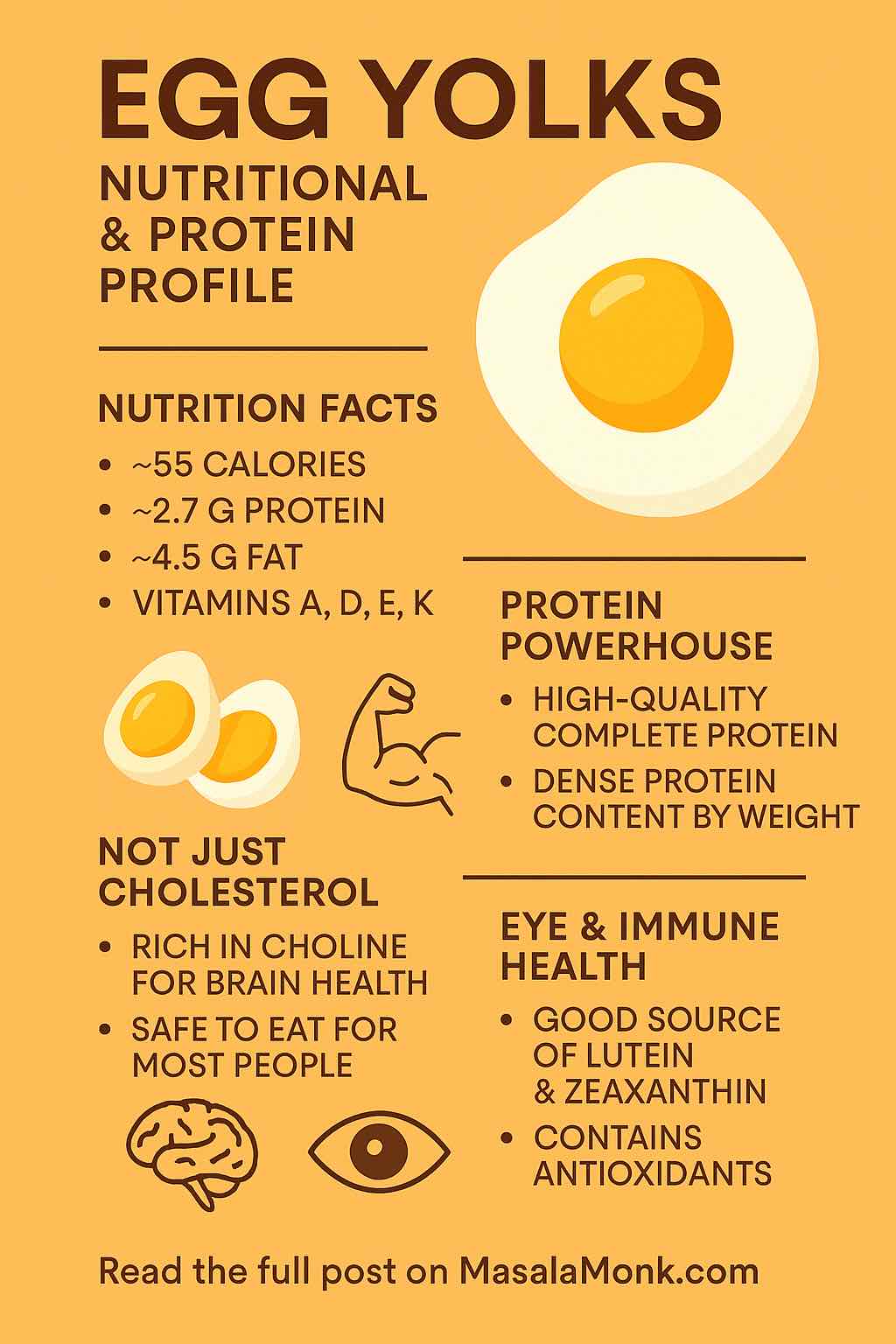
Egg yolks—often simply called the “yellow” of the egg—have spent decades unfairly demonized for their cholesterol content. But a surge of modern research is turning that reputation around. Far from being something to avoid, egg yolks are a nutritional treasure trove, crucial for muscle repair, brain function, eye health, and more. This post brings you the most up-to-date science, practical health tips, and smart answers to common questions about egg yolks, backed by both global research and related resources.
What’s Inside an Egg Yolk? | Macro & Micro Nutrition Deep-Dive
Egg yolks are nutritional multi-tools. Here’s what one large raw yolk (approx. 18g) delivers:
| Nutrient | Amount (per yolk) |
|---|---|
| Calories | ~55 kcal |
| Protein | ~2.7 g (complete protein) |
| Fat | ~4.5-5 g |
| Saturated Fat | ~1.6 g |
| Cholesterol | ~185 mg |
| Carbohydrates | ~0.6 g |
| Choline | ~147 mg |
| Vitamin A | 64 µg |
| Vitamin D | 18 IU |
| Vitamin E | 0.5 mg |
| Vitamin K | 0.1 µg |
| Folate | 24 µg |
| Vitamin B12 | 0.33 µg |
| Iron | 0.46 mg |
| Phosphorus | 66 mg |
| Selenium | 9.5 µg |
| Lutein + Zeaxanthin | 250 mcg+ |
Key Takeaway:
The yolk holds the vast majority of the egg’s vitamins, minerals, healthy fats, and almost half its total protein.
The Protein Power of Egg Yolks
Egg yolk is not just a fat source—it’s a potent, highly bioavailable protein food:
- Complete Amino Acid Profile: All essential amino acids, crucial for muscle growth, tissue repair, and metabolic health.
- Protein Density: Yolk is denser in protein than egg white by weight—~15.9% vs. 10.9% .
- Superior Bioavailability: Egg protein is a gold standard—digestibility of cooked egg is over 90% compared to only 51% if eaten raw .
- Muscle Health:
- New Research: Egg protein—especially from yolk—directly boosts muscle protein synthesis after exercise, making it ideal for athletes, older adults, and anyone in recovery .
Curious how egg yolks compare to plant-based proteins?
Check out 10 Delicious Plant‑Based Protein Sources for High‑Protein Meal Prep to see how yolk stacks up against quinoa, lentils, and more.
Choline: Brain and Body Supernutrient
- Choline is Essential: One yolk gives about 30% of your daily choline needs, crucial for brain development, memory, and nervous system health.
- Cognitive Benefits:
- A massive 2025 study found people who ate one egg per week had a 47% lower risk of Alzheimer’s disease, largely due to yolk-derived choline and its impact on neurotransmitter production .
- Pregnancy & Development: Choline is critical for fetal brain development, so pregnant women especially benefit from including yolks.
Related Read:
For a deep dive into why protein and choline matter for active lifestyles, see How to Eat 100 Grams of Protein a Day.
Egg Yolk Cholesterol: New Science, Not Old Myths
Egg yolks contain about 185 mg cholesterol each. But here’s what current science actually says:
- Dietary Cholesterol ≠ Blood Cholesterol: Most healthy people see little or no rise in blood cholesterol from eating eggs. Your saturated fat intake is a far bigger factor .
- Some People (Hyper-responders): About 25% of the population may see a cholesterol increase, but not enough to significantly impact heart health in most.
- Eggs in Context:
- Recent clinical trials show eating two eggs per day can lower LDL cholesterol when part of a diet low in saturated fat .
- Focus on whole-diet patterns: Mediterranean, DASH, or high-protein diets easily include whole eggs.
Compare egg types:
Read Are Expensive Eggs Worth Your Money? for a breakdown of nutrition, sourcing, and what to look for.
Eye, Skin, and Immune Health: Lutein, Zeaxanthin, and Antioxidants
Egg yolks are the best natural source of lutein and zeaxanthin—antioxidants that:
- Protect Eyes: Lower the risk of cataracts and age-related macular degeneration.
- Support Immunity: Yolk proteins like phosvitin have been shown to possess antimicrobial, anti-inflammatory, and antioxidant effects .
- Enhance Skin Health: Fat-soluble vitamins A and E in yolks help maintain glowing, healthy skin.
Want more on micronutrient-packed superfoods?
Explore Benefits of Nuts and Seeds – Protein‑Packed Superfoods for other immune-supportive foods.
The Truth About Yolk Color: It’s Not Nutrition!
- Orange or Yellow? Yolk color is entirely determined by the hen’s diet (e.g., more marigold petals = deeper color).
- Nutrition Content: No significant difference in vitamins, minerals, or protein between pale and dark yolks .
- What to Look For:
- Pasture-raised or omega-3-fortified eggs can offer added benefits—seek these out for higher quality fats.
Busting the myth:
Read Yolk Color & Nutrition – RealSimple for more on why color doesn’t equal quality.
Cooking Egg Yolks: The Science for Maximum Nutrition
- Best Cooking Methods:
- Boiling and poaching retain the most nutrients.
- Scrambling and frying can slightly reduce some vitamins but keep most protein.
- Innovative Tip: “Periodic cooking” (cycling eggs between hot and tepid water) produces silkier, more nutrient-preserving yolks and boosts antioxidant polyphenols .
- Bioactive Peptides: Gentle cooking preserves peptides and protein fractions (like phosvitin) that may support heart and brain health .
Want to explore more about maximizing nutrition in your meals?
Check out Protein in 3 Scrambled Eggs: Nutritional Insights and Benefits for creative, healthy ideas.
Beyond Nutrition: Egg Yolk Innovations in Food & Medicine
Modern research goes far beyond traditional nutrition:
- Phosvitin’s Role: Yolk proteins like phosvitin are being used to:
- Enhance mineral absorption (e.g., as a zinc carrier in supplements).
- Act as natural food emulsifiers and stabilizers (in sauces, mayonnaise, and food-tech applications).
- Deliver antimicrobial benefits (when combined with chitosan or in packaging).
- Muscle Formation & Tissue Engineering: Yolk fractions can help muscle cell growth—opening doors for regenerative medicine and sarcopenia treatments .
Curious about other non-egg protein innovations?
See The Power of Tempeh: 10 High‑Protein Plant‑Based Meal Prep Ideas for more.
Practical Tips: How Many Yolks Should You Eat?
- Healthy Adults: 1–2 whole eggs per day is safe for most people as part of a balanced diet.
- Athletes, Pregnant Women, Seniors: Often benefit from higher intake due to greater protein, choline, and micronutrient needs.
- Medical Conditions: If you have familial hypercholesterolemia, consult your doctor about dietary cholesterol.
Quick Questions
Is it safe to eat egg yolks every day?
Yes, for most people. Recent studies and dietary guidelines confirm moderate daily yolk intake is safe and beneficial.
What about raw yolks?
Cooking is best for digestibility and food safety. Raw eggs are less bioavailable and risk salmonella.
Can I just eat the whites?
Whites offer lean protein, but you’ll miss out on most vitamins, minerals, choline, and healthy fats.
Egg allergy?
Allergy can be to yolk, white, or both. See Egg Intolerance Symptoms for more.
Internal Resources for Deeper Reading
- Egg Whites for Weight Loss: A Nutrient‑Dense Alternative
- How Much Protein in Two Boiled Eggs?
- Calories & Nutrition in Egg Whites
- 10 Plant‑Based Meal Prep Ideas: Using Quinoa as a Protein Source
- 5 Turmeric and Moringa Smoothies for Weight Loss
- The Science of Protein: Maximizing Muscle Growth and Recovery
- Benefits of Eating Boiled Eggs at Night
Authoritative References & Further Reading
- NIH PMC: Egg White and Yolk Protein Atlas
- EatingWell: Eggs May Lower LDL Cholesterol
- VeryWell Health: Eggs and Alzheimer’s Prevention
- Medical News Today: Egg Nutrition
- RealSimple: Yolk Color & Nutrition
- Prevention: Yolk Nutrition
Conclusion: Embrace the Yolk
Egg yolks are among nature’s most concentrated sources of nutrition. Forget the outdated cholesterol scare—modern science celebrates the yolk for its brain-boosting choline, muscle-building protein, antioxidant carotenoids, and more.
Whether you’re a fitness enthusiast, parent, senior, or simply care about your health, don’t toss the yellow! Eat the whole egg, experiment with cooking methods, and benefit from what may be the perfect, portable superfood.
Want more myth-busting, science-backed nutrition deep-dives?
Bookmark this blog and follow for updates on the foods that truly power your life.
10 FAQs About Egg Yolks or Yellow: Nutritional & Protein Profile
1. Are egg yolks bad for your cholesterol and heart health?
No, recent research shows that for most healthy people, egg yolk cholesterol has little to no effect on blood cholesterol or heart disease risk. The bigger risk for heart health is high saturated fat and ultra-processed food intake, not eggs.
2. What makes egg yolks such a powerful source of nutrition?
Egg yolks are rich in protein, healthy fats, choline (for brain health), vitamin D, vitamin A, vitamin B12, iron, phosphorus, lutein, and zeaxanthin—nutrients not all found in the white alone.
3. How much protein is in an egg yolk compared to the white?
A large egg yolk contains about 2.7g of protein, while the white contains about 3.6g. The yolk’s protein is more nutrient-dense by weight and is a complete protein with all essential amino acids.
4. Is it safe to eat egg yolks every day?
For most people, yes—up to one egg per day is safe and may be beneficial. Only those with rare genetic cholesterol conditions or egg allergies should limit yolks, and should consult their doctor.
5. Do darker (orange) egg yolks have more nutrition than pale ones?
No. Yolk color only reflects the hen’s diet, not the nutrient content. Both orange and yellow yolks are nutritious, but pasture-raised or omega-3-enriched eggs may have slightly higher omega-3s.
6. What is choline, and why is it important?
Choline is an essential nutrient vital for brain function, memory, nervous system health, and fetal development. Egg yolks are among the richest choline sources available.
7. Can eating egg yolks support muscle building and workout recovery?
Absolutely. Egg yolks provide high-quality, easily digested protein and amino acids needed for muscle repair and growth—making them ideal for athletes and active people.
8. Are there health benefits to eating eggs at night?
Yes. The protein and healthy fats in eggs (including the yolk) promote satiety, support overnight muscle repair, and may help regulate blood sugar, making them a smart evening snack for many.
9. What are the risks of eating raw egg yolks?
Raw yolks carry a risk of salmonella infection and are less digestible than cooked. Cooking eggs improves safety and increases the body’s ability to absorb the protein and nutrients.
10. What’s the best way to cook eggs to preserve yolk nutrition?
Boiling or poaching eggs preserves the most protein and nutrients, but all common methods (including scrambling and frying) retain most of the yolk’s nutritional value. Avoid overcooking to maximize benefits.










